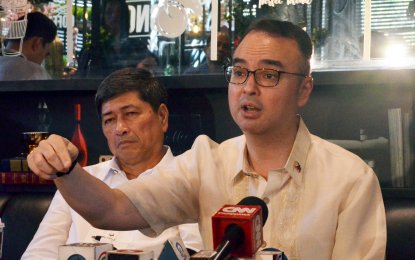Headline
Iceland, 37 others ‘misinformed’ on alleged rights abuses in PH

FILE: “We regret that Iceland and several other countries maintained their position despite our offer for them to visit the Philippines and objectively assess the human rights situation, especially at the community level,” Foreign Affairs Secretary Alan Peter Cayetano said in a statement from New York. (PNA photo)
MANILA — The Philippine government, through the Department of Foreign Affairs (DFA) on Sunday assailed Iceland and several nations that criticized the country for alleged human rights abuses, saying they chose to rely on “misinformation” fed by “parties that have politicized” the issue.
“We regret that Iceland and several other countries maintained their position despite our offer for them to visit the Philippines and objectively assess the human rights situation, especially at the community level,” Foreign Affairs Secretary Alan Peter Cayetano said in a statement from New York.
The official pointed out that “blind” criticism disables observers from seeing the “real situation” in the country, lamenting that he had personally asked Iceland Foreign Minister Gudlaugur Thor Thordarson to visit Manila to see it for himself.
“Unfortunately, it seems our friends are really not interested in arriving at the truth and would rather rely on the misinformation being fed to them by parties that have politicized and weaponized human rights,” he said.
“Politics is politics but politicizing human rights endangers lives.”
The statement comes after Iceland and 37 other countries urged the government “to take all necessary measures to bring killings associated with the campaign against illegal drugs to an end and cooperate with the international community” for an investigation.
Among the countries which criticized the Philippines were Australia, Canada, Denmark, Finland, Netherlands, New Zealand, Poland, Portugal, Romania, Slovakia, Slovenia, Spain, Sweden, Switzerland, Ukraine, United Kingdom and the United States.
The joint statement read by Iceland also noted the countries’ “concern” over reports of harassment against human rights defenders and journalists, and the alleged “harassment” of members of the Commission on Human Rights.
Xenophobia, anti-migrant sentiments
Philippine Permanent Representative to the United Nations Evan Garcia, for his part, asserted that the Philippines remains a responsible member of the UN Human Rights Council.
“We are respectful of our international human rights obligations. We remain a free, dynamic and democratic society. There is no basis, therefore, for the Council to be concerned with the situation in the Philippines,” he said.
Garcia cited the “rising xenophobia and anti-migrant sentiments” in parts of Europe and elsewhere, including some of the countries critical of the Philippines.
“We remind countries that have such severe shortcomings, including the United Kingdom and Australia, that the Philippines has preferred to engage with them in a positive manner, whether bilaterally or multilaterally,” he said. “This is in stark contrast with the needlessly confrontational attitude they have taken in [the Human Rights] Council.”
“The Philippines, a developing country even with its more than 100 million population, has been doing its small part in sharing the global burden of the protection of refugees, asylum-seekers, stateless persons and other persons of concern,” he added.





















